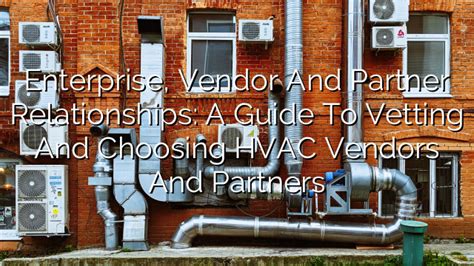Heating, ventilation, and air conditioning (HVAC) vendors play a crucial role in providing essential services to building owners, managers, and occupants. To ensure a smooth and efficient process, it's essential to understand the HVAC vendor application process and requirements. In this article, we'll delve into the details of the application process, requirements, and best practices for HVAC vendors.
Why is the HVAC Vendor Application Process Important?
The HVAC vendor application process is critical in ensuring that only qualified and reliable vendors are approved to work on various projects. This process helps to:
- Ensure compliance with regulatory requirements and industry standards
- Evaluate the vendor's technical capabilities and expertise
- Assess the vendor's financial stability and insurance coverage
- Verify the vendor's reputation and customer service record
- Identify potential risks and liabilities associated with the vendor

HVAC Vendor Application Process
The HVAC vendor application process typically involves the following steps:
- Pre-Qualification: The vendor submits an initial application, providing basic information about their company, including business license, insurance, and contact details.
- Qualification Review: The reviewing authority evaluates the vendor's pre-qualification application to determine whether they meet the minimum requirements.
- Request for Proposal (RFP): If the vendor passes the pre-qualification review, they are invited to submit a detailed proposal outlining their technical approach, pricing, and project schedule.
- Proposal Evaluation: The reviewing authority evaluates the vendor's proposal, assessing their technical capabilities, pricing, and overall value proposition.
- Contract Negotiation: If the vendor's proposal is accepted, contract negotiations begin to finalize the terms and conditions of the agreement.
- Contract Award: The contract is awarded to the successful vendor, and they are authorized to commence work on the project.
Key Requirements for HVAC Vendors
To be considered for approval, HVAC vendors must meet the following key requirements:
- Business License: A valid business license issued by the relevant state or local authority.
- Insurance: Proof of liability insurance, workers' compensation insurance, and other relevant insurance coverage.
- Technical Certifications: Relevant technical certifications, such as NATE certification, to demonstrate expertise in HVAC services.
- Financial Stability: A demonstrated record of financial stability, including proof of solvency and creditworthiness.
- Customer Service: A proven track record of excellent customer service, including references and reviews from previous clients.

Best Practices for HVAC Vendors
To increase their chances of approval, HVAC vendors should follow these best practices:
- Ensure Accuracy and Completeness: Ensure that all application documents are accurate, complete, and submitted on time.
- Provide Clear and Concise Proposals: Submit clear, concise, and well-structured proposals that demonstrate a thorough understanding of the project requirements.
- Demonstrate Technical Expertise: Highlight relevant technical certifications, training, and experience to demonstrate expertise in HVAC services.
- Showcase Customer Service: Provide references, reviews, and testimonials from previous clients to demonstrate a commitment to excellent customer service.
- Maintain Open Communication: Maintain open and transparent communication with the reviewing authority throughout the application process.
Common Mistakes to Avoid
HVAC vendors should avoid the following common mistakes:
- Inaccurate or Incomplete Applications: Ensure that all application documents are accurate, complete, and submitted on time.
- Poorly Written Proposals: Submit clear, concise, and well-structured proposals that demonstrate a thorough understanding of the project requirements.
- Lack of Technical Expertise: Highlight relevant technical certifications, training, and experience to demonstrate expertise in HVAC services.
- Poor Customer Service: Provide references, reviews, and testimonials from previous clients to demonstrate a commitment to excellent customer service.
- ** Failure to Maintain Open Communication**: Maintain open and transparent communication with the reviewing authority throughout the application process.

Conclusion
The HVAC vendor application process is a critical step in ensuring that only qualified and reliable vendors are approved to work on various projects. By understanding the application process, requirements, and best practices, HVAC vendors can increase their chances of approval and build a successful business. Remember to avoid common mistakes, maintain open communication, and demonstrate technical expertise and excellent customer service.
Gallery of HVAC Vendor Application Process






What is the HVAC vendor application process?
+The HVAC vendor application process is a critical step in ensuring that only qualified and reliable vendors are approved to work on various projects.
What are the key requirements for HVAC vendors?
+The key requirements for HVAC vendors include a business license, insurance, technical certifications, financial stability, and a proven track record of excellent customer service.
What are the best practices for HVAC vendors?
+The best practices for HVAC vendors include ensuring accuracy and completeness, providing clear and concise proposals, demonstrating technical expertise, showcasing customer service, and maintaining open communication.
